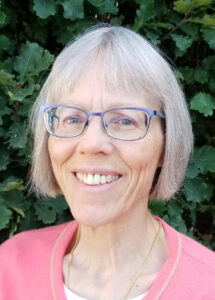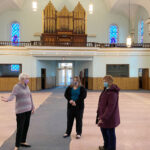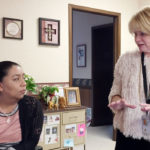By Barb Arland-Fye

Like my son Patrick, I was single, a few years out of college, living on my own and not looking forward to Thanksgiving alone. My brothers lived in another state and my parents had moved to Germany. It would be the first Thanksgiving without my close-knit family and I felt lonely.
This Thanksgiving, my husband Steve, our older son Colin and I were traveling out of state to share Thanksgiving with my parents and one of my brothers and his family. Patrick’s work schedule prevents him from joining us. As a daughter and a mother, I feel torn. Where should I be? I’ve asked God in my prayers.
My parents no longer travel long distances and time with them is precious in the twilight years of their lives. Patrick seemed OK about us leaving, saying he would stay at his house and give us a call on Thanksgiving. He looks forward to sharing a late Thanksgiving with us after we return home, which makes me feel better about our decision to leave.
All those years ago when I had nowhere to go for Thanksgiving, Linda, my boss at the time, invited me to join her and her husband and her widowed mother for Thanksgiving. The possibility of feeling out of place caused some hesitation, but the fear of loneliness persuaded me to say yes.
My memory of that Thanksgiving is sketchy except for one important detail: a warm feeling of belonging. Linda and her family treated me like a member of their family. They practiced the Christian virtue of hospitality: “For I was hungry and you gave me food, I was thirsty and you gave me drink, a stranger and you welcomed me” (Matthew 25:35).
The U.S. Census Bureau reports that 37 million (15%) of adults age 18 and over lived alone in early 2021, up from 33 million (14%) in 2011. Both of my sons and more than a few of their cousins fit in that category. Certainly not all of the adults living alone will spend Thanksgiving alone, but at least some of them will, and that breaks my heart.
Making Caring Common, a project of the Harvard Graduate School of Education, reported in February 2021 that loneliness “appears to have increased substantially since the outbreak of the global pandemic.” The report was based on a national survey conducted in the midst of the pandemic (October 2020) of about 950 Americans. “More than 1 in 3 survey respondents (36%) reported ‘serious loneliness’ — that is, feeling lonely ‘frequently’ or ‘almost all the time or all the time’ in the four weeks prior to the survey. A staggering 61% of young adults aged 18-25 and 51% of mothers with young children reported serious loneliness.”
Among the recommendations of Making Caring Common is “Working to restore our commitments to each other and the common good to renew a founding promise of this country: that we have commitments to ourselves, but we also have vital commitments to each other, including to those who are vulnerable (go to makingcaringcommon.org for more recommendations).” This advice echoes Catholic Social Teaching.
As we enter Advent, we need to make ourselves aware of people in our midst who could use some companionship or an invitation for dinner or someone willing to provide the listening ear of the heart. We need more people like Linda and her family, who welcomed a stranger into their home at Thanksgiving and left a lasting impression.
(Contact Editor Barb Arland-Fye at arland-fye@davenportdiocese.org)











